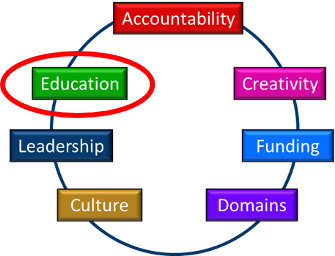
In my work with the EDM Council’s Data Management Capability Assessment Model (DCAM) 3.0 development group, we are adding a capability that has remained under the radar in our industry: the responsibility of the Data Management Program to determine concept and knowledge gaps within its staff resources. The organization should then plan, organize, and make a commitment to establishing a thoughtful, responsive approach to uplifting staff understanding and knowledge.
Like the Data Management Program itself, data management education should be a sustained function that evolves over time. In this column, we will propose perspectives, structures, approaches, and activities to help an organization establish and successfully manage an organization-wide education program.
We’re going to focus on why EDM Education is needed, what learning objectives it should deliver, and who needs it. The following column will address when it is needed, creating an education plan, discipline training and associated metrics, certifications, and how education should be conducted, including learning techniques and tips to help make your courses interesting and effective.
Bob Seiner of KIK Consulting and founding publisher of TDAN reminded me that the basic distinction between “education” and “training” should be clarified. Although we often use the term “training” generically, as Bob succinctly stated, “The aim of education is to familiarize people with concepts; training is what and how to do something.” For this column, the emphasis is conceptual learning, and we’ll briefly address skills, process training, and technology training.

Why is EDM education needed? Because if the prevailing attitude is “Do what we’ve always done,” then the result is “Get what you’ve always got.” When an organization has evolved to value its data and is committed to improve the definition, quality, and access to data,[1] it’s a mistake to believe that this foundational transformation will be as easy as flipping a switch (‘Eureka! We’re all Data People!). Some executives (in all industries) want to believe that they can simply direct their staff to “go forth and do!” without a clear strategy or providing commensurate learning opportunities, but our answer comes from the philosopher Bertrand Russell — “To understand the actual world as it is, not as we should wish it to be, is the beginning of wisdom.[2]”
However, most organizations are aware that developing, integrating, maintaining, and sharing accurate and timely data is critical to their business goals and objectives. The challenge is how to achieve understanding and unanimity of purpose, direction, motivation, and action. As George Leonard, founder of Esalen Institute, stated — “Ultimately, human intentionality is the most powerful evolutionary force on this planet.” Data management education is the engine of empowerment[3] and enlightenment.[4]
Even in successful organizations, a significant percentage of staff has yet to grasp that “Data is a thing.” According to Jeff Wolkove, Arizona Strategic Enterprise Technology, the State Data Management Architect for the State of Arizona, who established a State-wide DM Education program for 100 agencies. They’re accustomed to managing items like computers, desks, and networks, but the concept of ‘asset’ isn’t typically generalized to data. For example, people intuitively know that they should enter correct data into a system, but they usually aren’t considering impacts on business processes or decisions if the data is incomplete or wrong, so they may not validate as thoroughly in the interest of speed.
For effective engagement in data governance tasks — such as defining data requirements, participating in data quality improvement efforts, defining business terms, and defining and using metadata — there are many individuals and staff roles that come into play. Each of them has to develop an understanding of the organization’s data management goals and objectives, and learn WHY their role is important to the organization,as well as WHAT activities they are responsible for performing. A thoughtfully planned and orchestrated data management Education program delivers on the WHY and the WHAT, by equipping staff to conduct collaborative analysis and decision-making with confidence and enjoyment.
Consider your staff as your customers. Instead of purchasing your products and services, you want them to perform energetically in creating and improving your products and services. Education fosters both intrinsic motivation and know-how. Staff time is a precious resource, so you to maximize that time by creating favorable conditions. You want your ‘internal customers’ to achieve satisfaction and want to continue in their role — job satisfaction is a major factor in employee retention.
Conceptual education about data management disciplines — how they work together to evolve the desired target state for the organization — supplemented by skills-specific learning, for example, how to create a quality rule, how to define a business term, how to work with IT for a new application, etc. enables individuals to accomplish three learning goals:
- To expand their perspective beyond a specific area of action and influence, like an astronaut’s first voyage into space and seeing the whole earth – the “aha!”
- To communicate effectively about data with colleagues and management through a common conceptual schematic and shared terminology
- To organize concepts and skills that they may already know and act upon, but haven’t yet put together in a comprehensive structure, like being able to see the pattern of the strands in a spider’s web.
My teaching experiences have taught me that conveying key concepts is essential, but they don’t ‘stick’ if they remain abstract. They must be brought to life, illustrated by practical, real-world scenarios. Like many of my industry colleagues, I make extensive use of case studies, sample scenarios, hands-on individual and group exercises, and many implementation examples.
For example, I teach DCAM Plus, an enhanced version of the DCAM Certification course, which includes an additional day of team and groups exercises, teaching approaches and skills that help attendees succeed in their data-centric tasks. Attendees (whose job roles encompass a broad range, such as business analyst, data governance leader, technical data steward, data architect, auditors, privacy, and risk leaders) emerge with a broader viewpoint and renewed enthusiasm for participating in their organization’s DM projects. The bulk of the feedback received is that the course enhanced their understanding of:
- Why are all of the data management disciplines are important?
- How are they mutually interdependent across the organization (the Data Management Program)?
- What the benefits are to the organization of performing them competently;
- What we look for in evaluating the current state of capabilities
Another strong argument for why EDM education is illustrated by Jeff Wolkove. Without any State-wide mandates for EDM, he determined that ‘Driving change through implementing policies is the key.’ With a multi-agency governance group (cultivated, recognized, and rewarded) he obtained approval for and rolled out a Data Governance Organization Policy, a Data Governance Operations Policy, an Interoperability Policy, a Data Technology Policy, and a Data Quality Policy. When policies are included in State agency audits, they drive compliance.
So, he led the horse to water, but how was he going to get them to drink? With 100 different agencies, each operating separately, and no previous state-wide emphasis on data management, each had significant divergences in data management concepts, terms, capabilities, and approaches. Championing a number of Data Management Assessments, Jeff raised awareness of improvement plans and roadmaps across the State and determined that he now needed a tasty “carrot” to bring the majority of employees into the fold. (A key element of “winning hearts and minds,” as in “Why should I care?” and ‘How are you going to help me?’)
As George Leonard stated, “Mastery is not about perfection. It’s about a process, a journey. The master is the one who stays on the path day after day, year after year.” Jeff sponsored several data management certification courses for his governance group, and then directed development of a full suite of computer-based training (CBT) for the entire State government,[5] which has been taken by over 6,600 State employees to date, with an expected eventual target of 33,000 employees. Since the ability to comply with policies requires a minimum knowledge base, the carrot/stick construct Jeff envisioned and implemented is clearly demonstrating its effectiveness.
In our next column, we’ll
focus on what learning objectives the data
management education program should deliver, and who needs it.
[1] The establishment of an organization-wide DM Program is the first signpost of this commitment.
[2] This seems self-evident, right? So, let’s fight the predilection to engage in fantasy thinking.
[3] Knowledge provides confidence, which in turn engenders enthusiasm and successful accomplishments. Therefore, as the sages say, knowledge is power.
[4] Here, enlightenment refers to ‘the state of being well-informed and guided by rational thought’’
[5] Based on industry standard data management reference models, and Jeff’s learned experiences from working to elevate data management in the State and encourage stewardship.
